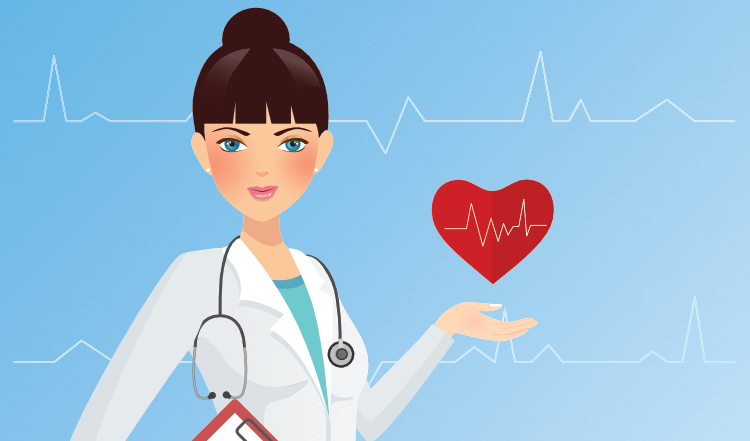
If you’re a nurse, you have many opportunities to use English! Whether you are using a reference book or treating an English-speaking patient, these words are for you.
This post is organized by a situation, so you can jump to the section that is most relevant to you!
- Health Habits
- Vocabulary for Checkups
- Vocabulary for Diseases and Treatment
1. Health Habits
Aerobics: exercise that increases one’s dependence on oxygen
Calorie: the amount of energy needed to increase the heat of 1g of water by 1 degree Celsius
Diet: to restrict the foods that you eat for a period of time, usually to lose weight
Excess: having too much of something
Function: what something can be used for
Growth: irreversible increase in the mass and height of an organism
Gymnasium: a place with various equipment for physical training
Gym: short for gymnasium
Habit: something that a person does out of custom
Harmful: something that can cause damage
Health: a state of well-being, without disease
Hygiene: practices that contribute to disease prevention, particularly with sanitation and cleanliness
Nutrition: the process of eating the right balance of foods to provide your body with enough energy
Over-the-Counter Drugs: medications you can buy without a prescription
Posture: the position of the body
Respiration: the act of breathing
Working out: exercise
2. Vocabulary for Checkups
Addiction: becoming unable to quit something, i.e. a drug addiction
Allergy: a hypersensitive reaction to something
Ache: a dull but persistent pain
Blood pressure: the pressure that blood exerts of the walls of blood vessels; can be measured quickly to assess health
Calcium: the element Ca, which strengthens bones and is used in nerve signaling
Clinical trial: research that is done to test how well a health product works, such as a drug or other medical treatment
Diagnose: to determine what an illness or disease is Disability: when one is not able to perform normally
Hormone: a substance released by a gland that influences the body’s emotions, growth, digestion, and other processes
Immunization: the act of protecting a person from disease
Insurance: a guarantee by a company or government to pay for certain medical expenses if you have pay a premium beforehand
Prenatal: before birth
Vital signs: clinical measurements that indicate the state of a patient’s body functions
Weight: the mass of a person
3. Vocabulary for Diseases
AIDS: acquired immune deficiency syndrome; caused by HIV; a very serious immune system disease that often results in death
Anemia: a deficiency of red blood cells
Anorexia: a prolonged starving of the self
Antidote: a medicine that reverses the effects of a poison
Anxiety: an unpleasant worrying about the future
Bacteria: single-celled organisms that can be either beneficial or harmful
Cure: something that gets rid of a disease or disability
Dehydration: not having enough water
Depression: a prolonged feeling of helplessness and hopelessness that may be accompanied by hormonal changes in the body
Disorder: when one is affected by an abnormal condition
Fracture: breaking of something, such as bone
Frenzy: a state of madness or uncontrolled behavior
Hazard: something, including a chemical or activity, that is harmful to someone’s health
HIV: the human immunodeficiency virus that causes AIDS; spread through bodily fluids
Hyperglycemia: having excess sugar in the blood
Hypertension: high blood pressure
Infertility: the inability to or difficulty with becoming pregnant and having children
Inflammation: a swelling of a body part due to an infection, usually by a virus or bacteria
Influenza: a highly contagious viral disease that resembles a cough; causes fever, aches, and general discomfort
Kidney disease: an inability of the kidney to carry out its normal functions; often a very expensive disease to treat
Lead poisoning: being exposed to toxic lead (an element) and exhibiting symptoms such as impaired memory and loss of muscle control
Metabolism: chemical processes that help a person digest food and maintain life
Pregnancy: having a child developing
Prescription: instructions written by a doctor authorizing a patient to be put through a medical treatment
Rehabilitation: restoring health after a disease or disability, through training and therapy
Sexually Transmitted Infections: diseases that are passed through sexual contact, including HIV
Skin Cancer: an abnormal growth of skin cells that results in harm to the body
Sore Throat: pain in the throat caused by a bacteria or virus
Toxin: a poisonous and harmful substances that causes a negative reaction in the body
More for you:
››› AT THE DOCTOR Dialogues and Vocabulary List
››› SHOPPING Phrases, Dialogs and Phrasal Verbs!
››› English Vocabulary For Information Technology Professionals
››› Definition of Midwife ››› examples – dialogue – synonyms – related words


























